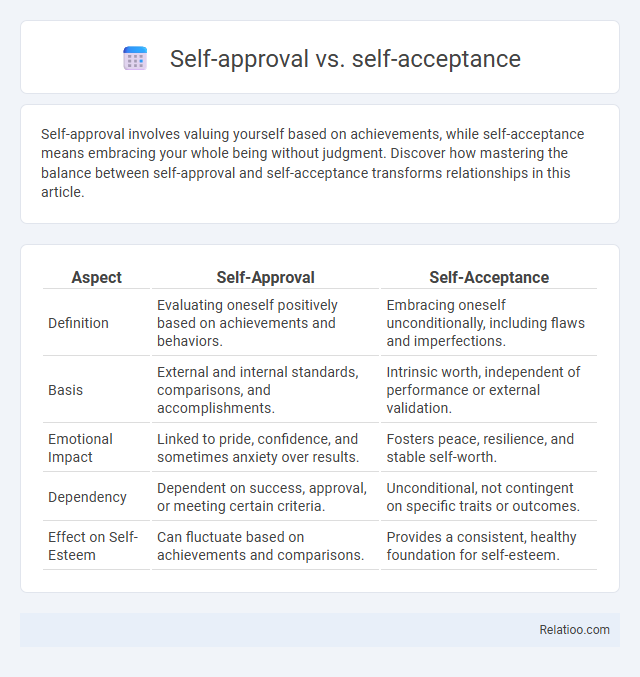Self-approval involves valuing yourself based on achievements, while self-acceptance means embracing your whole being without judgment. Discover how mastering the balance between self-approval and self-acceptance transforms relationships in this article.
Table of Comparison
| Aspect | Self-Approval | Self-Acceptance |
|---|---|---|
| Definition | Evaluating oneself positively based on achievements and behaviors. | Embracing oneself unconditionally, including flaws and imperfections. |
| Basis | External and internal standards, comparisons, and accomplishments. | Intrinsic worth, independent of performance or external validation. |
| Emotional Impact | Linked to pride, confidence, and sometimes anxiety over results. | Fosters peace, resilience, and stable self-worth. |
| Dependency | Dependent on success, approval, or meeting certain criteria. | Unconditional, not contingent on specific traits or outcomes. |
| Effect on Self-Esteem | Can fluctuate based on achievements and comparisons. | Provides a consistent, healthy foundation for self-esteem. |
Understanding Self-Approval and Self-Acceptance
Self-approval involves recognizing and valuing your own actions and qualities, while self-acceptance means embracing all aspects of yourself, including flaws and imperfections. Your journey towards emotional well-being deepens as you cultivate self-approval by affirming your strengths and self-acceptance by acknowledging your humanity without judgment. Developing both concepts enhances resilience, boosts confidence, and fosters a balanced self-view.
Defining Self-Approval: Validation from Within
Self-approval is the internal validation individuals grant themselves, reflecting confidence in their choices and actions without relying on external opinions. It differs from self-acceptance, which involves embracing personal flaws and strengths unconditionally, and self-esteem, often shaped by comparisons and achievements. Cultivating self-approval fosters authentic self-worth rooted in inner belief rather than external affirmation.
What is Self-Acceptance? Embracing Your Whole Self
Self-acceptance involves fully embracing your entire being, including strengths, weaknesses, and imperfections, without harsh judgment or denial. It differs from self-approval, which refers to valuing oneself based on achievements or meeting personal standards. Cultivating self-acceptance fosters mental well-being, resilience, and authentic self-worth by promoting unconditional compassion toward oneself.
Key Differences Between Self-Approval and Self-Acceptance
Self-approval involves evaluating oneself positively based on achievements and external standards, often tied to performance and validation. Self-acceptance reflects a deeper, unconditional acknowledgment of one's inherent worth, including flaws and imperfections, without judgment. The key difference is that self-approval depends on meeting certain criteria, while self-acceptance is rooted in embracing one's whole being regardless of outcomes.
The Role of Self-Approval in Personal Growth
Self-approval plays a crucial role in personal growth by fostering a positive mindset that encourages resilience and self-motivation. Unlike self-acceptance, which involves embracing your flaws and strengths as they are, self-approval emphasizes actively recognizing and validating your achievements and efforts. You build confidence and sustain long-term development by cultivating self-approval, enabling deeper progress in your goals and well-being.
How Self-Acceptance Impacts Mental Wellbeing
Self-acceptance involves embracing all aspects of oneself without judgment, which fosters resilience and reduces stress by promoting emotional stability. Unlike self-approval, which depends on external validation or achieving certain standards, self-acceptance provides a stable foundation for mental wellbeing by encouraging compassion and reducing self-criticism. This inner harmony strengthens psychological health and supports long-term emotional growth.
The Pitfalls of Seeking Only Self-Approval
Seeking only self-approval can create an endless cycle of dependence on external validation, leading to fleeting confidence that shifts with others' opinions. Your emotional well-being suffers when self-worth hinges solely on meeting approval quotas instead of embracing genuine self-acceptance, which fosters resilience and inner peace. Prioritizing self-acceptance over self-approval cultivates a stable sense of identity anchored in authenticity rather than conditional approval.
Cultivating True Self-Acceptance: Practical Steps
Cultivating true self-acceptance involves embracing your strengths and weaknesses without judgment, which differs from self-approval that seeks external validation and self-esteem tied to achievements. Practical steps include mindfulness practices, positive self-talk, and setting healthy boundaries to foster an authentic relationship with yourself. By prioritizing self-compassion over perfection, you enhance emotional resilience and overall well-being.
Balancing Self-Approval and Self-Acceptance
Balancing self-approval and self-acceptance involves recognizing personal achievements while embracing inherent worth without external validation. Self-approval drives motivation and goal attainment through positive reinforcement of behaviors, whereas self-acceptance fosters emotional resilience by acknowledging flaws and limitations without self-judgment. Integrating both concepts enhances mental well-being and promotes sustainable self-growth by blending confidence in one's abilities with unconditional self-compassion.
Achieving Lasting Self-Worth: The Power of Both Concepts
Achieving lasting self-worth involves embracing both self-approval and self-acceptance as complementary forces; self-approval drives motivation by recognizing your accomplishments and strengths, while self-acceptance fosters inner peace by acknowledging your imperfections without judgment. Balancing these concepts empowers you to build a resilient, authentic sense of value that withstands external criticism and setbacks. Cultivating both self-approval and self-acceptance creates a sustainable foundation for enduring self-esteem and personal growth.

Infographic: Self-approval vs Self-acceptance
 relatioo.com
relatioo.com